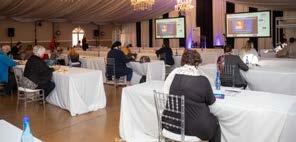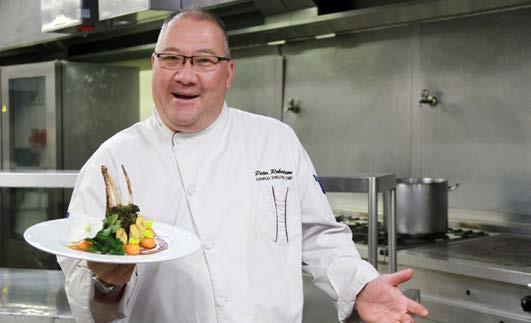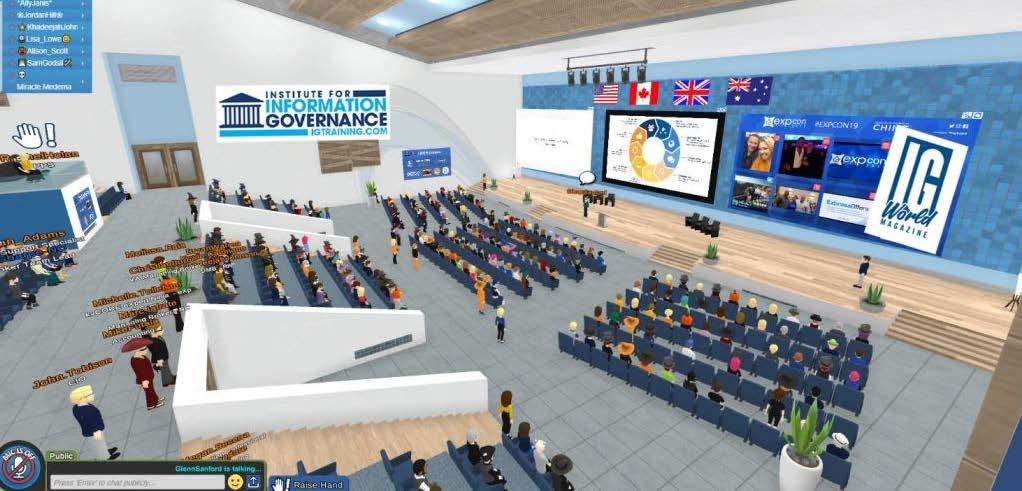
10 minute read
The proof of the pudding


Advertisement
Activity within the business events industry may be limited by lockdown restrictions but, with two proof of concept hybrid events under its belt, it is showcasing incredible innovation.
On Wednesday, 22 July 2020, the Southern African Association for the Conference Industry (SAACI) organised the Proof of Concept event in collaboration with the South African Events Council and in association with the Events Safety Council.
The hybrid event took place in five major city centres across South Africa, as well as online, with the aim of demonstrating to the industry that events can be safely held during lockdown while observing all social distancing protocols.
“The work we undertook in preparation for SAACI’s recently held Proof of Concept event provided the opportunity for us to work with various disaster management teams around


the country on how we delivered the event,” explains Glenton de Kock, CEO of SAACI.
The in-person elements were hosted at Century City Conference Centre in Cape Town, Southern Sun Elangeni & Maharani in Durban, the Focus Rooms in Johannesburg, Running Waters Exclusive Venue in Port Elizabeth, and the CSIR International Convention Centre in Pretoria.
Live-streaming was managed overall by Magnetic Storm and supported by Multi-Media in Cape Town, while Selbys assisted in Durban; AV Active stepped in to support Johannesburg, with Magnetic Storm driving the entirety of Port Elizabeth’s digital component and EPH Group supporting Pretoria. ABIDING BY REGULATIONS The Proof of Concept event saw just over 500 people in attendance, with 250 people attending in-person and a further 305 attendees streaming the event online.
“We are very cognisant of the fact that the pandemic is only now really on the rise in South Africa and it is not business as usual. We have a deep commitment to putting the well-being of our clients and guests before any of our own business imperatives and take a long-term view in monitoring and controlling the situation in our facilities,” notes Bronwen Cadle de Ponte, GM at the CSIR ICC. One of the key takeaways from the Proof of Concept event was that hybridised events are significantly more sustainable, as this reduces the event’s carbon footprint enormously. This also ties into the costs associated with hosting an event; by going hybrid, both the costs and carbon footprint contributors associated with venue hire, travel, accommodation, catering and other waste such as printed matter are immediately slashed. Additionally, digital and hybrid events can increase accessibility and reach, with geography no longer being a barrier for those who are not able to attend physically.
Event technology is also increasing in popularity, with the use of online registrations and apps eliminating the need for brochures and programmes.
A worthy win
On 1 September, the PCO Alliance Network hosted its hybrid Proof of Concept event in collaboration with key industry bodies. Meetings magazine delivers the highlights.
Spring Day was welcomed by the PCO Alliance Network’s Reignite your Business Proof of Concept event, which showcased the readiness of the MICE industry in being able to safely host a live event during the Covid-19 pandemic lockdown.
The event was hosted in partnership with Focus Rooms, The Capital Hotel Group and Cape Town International Convention Centre, which staged the event across five different venues, effectively demonstrating that the events industry is ready to open safely.
Adopting the SA Event Council Safety Guidelines, which were drafted during lockdown by the Event Safety Council, the organisers found the use of this document imperative in their preparation for an event in the current climate.
“Yes, we have had to change our thinking and mindset – the stringent event safety protocols add an additional layer on to the safety protocols we have always used. As event organisers, planning is what we do best, and the safety of all our participants is of utmost importance,” highlighted Ellen Oosthuizen, chairperson of PCO Alliance.
The catalyst for Reignite your Business was the Proof of Concept event organised by the Southern African Association for the Conference Industry (SAACI) in July under the auspices of the



SA Events Council. While the Proof of Concept conference specifically targeted conferencing stakeholders, Reignite Your Business was aimed at building confidence in the ability of the events industry to mount safe events for the corporate sector as well.
An example of the ‘new normal’ multi-venue, hybrid event, the main performance hub was hosted in the Focus Rooms in Johannesburg and streamed to all other venues between 09:00 and 14:30. Attendees in each venue also enjoyed live entertainment in-person.
At the Focus Rooms, there were musicians entertaining on arrival, with Duane Rockwell as MC and an interactive game show.
The Capital On The Park’s arrival entertainment was provided by Kristel Birkholtz with MC/comedian Farai, followed by a Blue Naartjie Events team-building activity after lunch.
The Capital Menlyn provided arrival entertainment by Jacques Lagesse and MC Henry Motau.
Following lunch, live entertainment was provided by Christina Rodriquez & Team, while entertainment at The Capital Pearls Umhlanga was provided by the School of Arts.
CTICC’s guests were entertained by Elton, with MC Ernest van Sitter. In the afternoon, comedian Alan Committee had the audience in stitches.
The PCO Alliance’s Reigniting your Business event was not to be missed.
“All the entertainers, performers, suppliers and venues contributed their services to build confidence so that we can all get back to business. We are committed to rebuilding the events industry and I am confident that we can safely host corporate events once again,” concluded Ellen.

ABOUT THE SA EVENTS COUNCIL

The PCO Alliance is one of 13 associations that form part of the SA Events Council – an industry-wide coalition uniting the broader events industry to speak with a unified voice. The council has representation from the Southern African Association for the Conference Industry (SAACI), the Association of African Exhibition Organisers (AAXO), Exhibition and Events Association of Southern Africa (EXSA), Southern African Communications Industries Association (SACIA), Technical Production & Services Association (TPSA), the Event Safety Council (ESC), Council of Events Professionals Africa (CEPA), Event Greening Forum (EGF), Society for Incentive Travel Excellence (SITE), Professional Conference Organisers’ Alliance Network (PCOAN), Professional Speakers Association of Southern Africa (PSASA), the International Congress and Conventions Association (ICCA) and the South African Live Performance Association (SALPA).
With digital and virtual events becoming all the rage, Meetings looks at just some of the requirements associated with planning and budgeting for a virtual event.
BUDGET LIKE A BOSS
The Covid-19 pandemic has taught events professionals a thing or two, particularly how to innovate. Lockdown restrictions and social distancing protocols have meant that in-person events are now taking a backseat to virtual and digital experiences, which is uncharted territory for some.
For event planners and organisers, the rules of engagement haven’t changed – just the means. The objectives of hosting events on a digital platform of sorts remain focused on delivering the same outcomes of live events, which are centred on creating in-depth, impactful and meaningful discussions.
Within this, budgeting for aspects such as venue hire, decor and catering fall away and shift to finding the most suitable tech solution to support your event.

KEY CONSIDERATIONS Start with the basics of when your event will take place and the timelines you are working towards. Look at how long you want your event to be, who your audience is, and how many sessions and speakers you will have. Unpack what type of sessions you want to include – general, breakout, or light-hearted and interactive – and what will be most fitting for your attendees?
To take this one step further, Endless Events, a US-based events production company, has put together the following handy list of considerations for planning virtual events: If anything were possible, what would the virtual experience look like? Virtual events offer a lot of new possibilities, so imagine that anything were possible for your event, without technological or budgetary
constraints. This will be a great starting point for what you’d want your virtual event to look like.
Think about what metrics you want to closely monitor throughout the experience: the number of attendees, sales, engagement, profit, new contacts – whatever is relevant to you and your organisation. What are you struggling with most planning a virtual event? Assuming this is your first virtual event, you’re probably

struggling with several aspects. Think about them and write them down so you can present them when meeting with a virtual event production company. What part of your event gives you the largest ROI? Ideally, you’ll be able to replicate the most profitable parts of your in-person event in your virtual event. Consider what they are and why they are indeed the most important! What are the goals of your virtual event? In the same way your in-person events have goals, so do your virtual ones. What’s the why behind it? What specific organisation goals will this event help you achieve? What will attendees accomplish by attending your event? Why should people take the time of day to attend your event? Compile a list and make it convincing! Who are your attendee personas? Define your attendee personas the same way you would in a regular situation. Who are they? What are their jobs? Their interests? Know exactly who you’re trying to captivate with this event so you can relay the information when meeting with a virtual event production company. Who is on the team? Who are all the people involved in planning the event and what are their roles? Do you have a ballpark number for the budget of your virtual event? If you are working with a production company, giving them an idea of your budget is extremely important. This way, they know what will and won’t be possible for your virtual event. Think about how much you have budgeted for each individual chunk of the event. If you’re not sure, tell them what the number was for the AV and production section of your inperson experience. What are the most important points of the show for your attendees? These are the parts you’ll want to go seamlessly, so it is paramount that you share the information with the people who’ll be putting the event together!
START AT THE BEGINNING Once you have conceptualised your event and thoroughly understood all your considerations, list each line item – detailing and documenting all your costs on a spreadsheet. This is an easy way to start calculating your budget, as it gives a simple overview of each item and the related costs. If you are working with a team, create a document that is accessible in the cloud – on Google Drive or something similar.
Get into the nitty gritty and small and potentially unforeseen costs by being as clear and specific as possible. Avoid lumping items together and break down each one with actual and estimated costs as a reference for the future, so that you can get an idea for the discrepancies between these two margins. It is also recommended that you conduct due diligence by sourcing alternative quotes to better understand what market-related pricing you can expect. Shop around for reputable suppliers and research reviews to ensure that you will receive quality service.
Be especially choosey when it comes to the platform you will be using to host your virtual events and understand all the requirements you will need, from connectivity to equipment such as webcams and mics – it is critical that you put together a quality broadcast for your audience in order to provide the most seamless experience possible.










